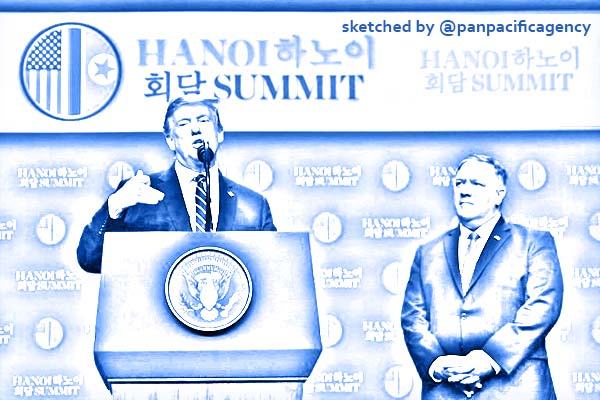Trump-Kim summit unlikely before US elections: US official

US President Donald Trump (L) speaks as US Secretary of State Mike Pompeo looks on during a press conference following the second US-North Korea summit in Hanoi on February 28, 2019. The nuclear summit between US President Donald Trump and Kim Jong Un in Hanoi ended without an agreement on February 28, the White House said after the two leaders cut short their discussions. (AFP/Saul Loeb). Sketched by the Pan Pacific Agency.
WASHINGTON D.C., Jun 30, 2020, The Korea Herald. A third US-North Korea summit is unlikely before the US presidential election in November, but the door is open to diplomacy, US Deputy Secretary of State Stephen Biegun said Monday, The Korea Herald reported.
“I think it’s probably unlikely between now and the US election,” Biegun told a forum hosted by the Washington-based think tank German Marshall when asked about a potential summit between Trump and Kim.
The US point man on North Korea however said there was still time for the two sides to engage each other to make more progress in the nuclear negotiations, stalled over conflicting demands from Washington to denuclearize first and from Pyongyang to ease sanctions first.
Biegun, who at the forum called the coronavirus pandemic a “wet blanket” rendering an in-person summit difficult to open, was reportedly set to visit South Korea in early July, in what would be the first visit by any American ranking official since the outbreak of the pandemic this year.
Seoul’s Foreign Ministry was in consultation with local health authorities to grant Biegun a waiver so he would not have to undergo self-quarantine procedures upon entry, as demanded from all incoming foreign nationals at the moment here, a local report said, citing diplomatic sources.
Biegun, expected stay here no more than three days, according to those sources, discussed North Korea nuclear issues with his counterpart Lee Do-hoon, Seoul’s chief nuclear negotiator, two weeks ago in the US.
Observers speculate the two chief nuclear envoys would most likely release a message for the North while it is still mulling its next step having suspended the military action it had promised against the South as retaliation for Seoul allowing defectors to fly leaflets into Pyongyang.
Pyongyang had complained about anti-Kim leaflets sent by defectors here, blew up an inter-Korean liaison office in protest, but put off further aggression it had promised.
“Leader Kim didn’t withdraw from aggression; he postponed it,” said Moon Chung-in, President Moon’s special adviser for foreign and security affairs.
He added, “Pyongyang should come forward after some time.”
Other experts said Biegun could be coming to help facilitate the closure of the prolonged negotiations on defense cost-sharing for the upkeep of 28,500 American troops here. Seoul and Washington have yet to ink a deal due to differences over the total costs.
By Choi Si-young